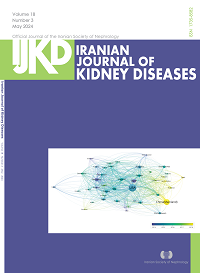Association Between the G82S Polymorphism of the Receptor Gene for Advanced Glycation End-products and Soluble Serum Levels RAGE with Diabetic Nephropathy in the White (Asian) Race
DOI:
https://doi.org/10.52547/wngvvr19Abstract
Introduction. Diabetic nephropathy is one of the most common severe symptoms of diabetes mellitus. Hyperglycemia can lead to tissue damage and inflammation due to mediators such as receptor for advanced glycation end-products (RAGE). Therefore, in this study, we aimed to investigate the association between the G82S polymorphism of the RAGE gene and diabetic nephropathy in diabetic patients.
Methods. In this case-control study, 356 participants (158 men and 198 women) of Asian race, aged 45 to 65 years, who were diagnosed with type 2 diabetes mellitus based on their fasting plasma glucose levels were enrolled. DNA was isolated from the participants’ blood samples and genotyped using TETRA -Primer ARMS-PCR. Serum protein concentration of soluble RAGE (sRAGE) was also determined by enzyme-linked immunosorbent assay (ELISA).
Results. Although we found differences in genotyping of participants between homozygous AA and GG and heterozygous GA in the studied groups, the differences were not significant (P = .568). In addition, we found no significant correlation between the G82S polymorphism of RAGE and the development of diabetic nephropathy. Serum levels of sRAGE were only slightly decreased in patients with diabetic nephropathy compared with diabetic patients (P > .05).
Conclusion. The results of this study indicate no significant association between the G82S polymorphism in the gene RAGE and the development of diabetic nephropathy. Serum levels of sRAGE were only slightly decreased in patients with diabetic nephropathy compared to diabetic patients without nephropathy. Therefore, the study suggests that there is probably no association between the G82S polymorphism in the gene RAGE and the development of diabetic nephropathy.
DOI: 10.52547/ijkd.7872


